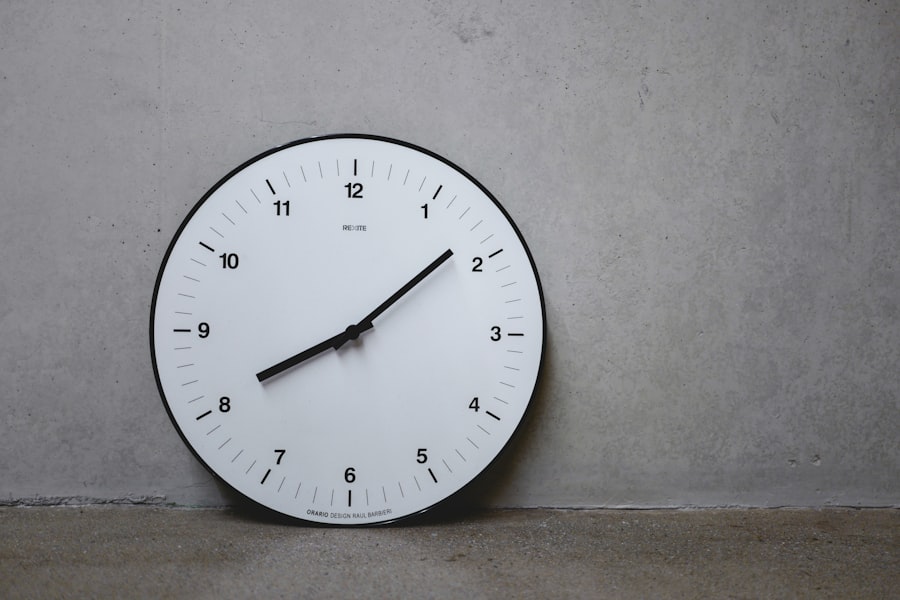The perception of time is a complex and multifaceted phenomenon that has intrigued scientists, philosophers, and artists alike for centuries. It is not merely a measure of the passing seconds, minutes, and hours; rather, it is a subjective experience shaped by various cognitive processes. The brain’s ability to perceive time is essential for navigating the world, allowing individuals to anticipate events, plan actions, and make decisions.
This intricate process involves a network of brain regions that work in concert to create a coherent sense of temporal flow. Understanding how the brain perceives time can shed light on human behavior, cognition, and even the nature of consciousness itself. As researchers delve deeper into the mechanisms underlying time perception, they uncover the interplay between various factors such as attention, emotion, memory, and even cultural influences.
The subjective experience of time can vary dramatically from one individual to another and can be influenced by a myriad of external and internal conditions. This article aims to explore the different dimensions of time perception, examining the roles of specific brain regions, the impact of emotions and attention, and how age and cultural factors shape this fundamental aspect of human experience.
Key Takeaways
- The brain perceives time through multiple regions working together, influenced by emotions, attention, and memory.
- Emotional states and focus levels can significantly alter how we experience the passage of time.
- Neurological disorders and aging affect time perception, revealing its complex neural basis.
- Cultural, environmental, and species differences highlight the variability in time perception across contexts.
- Understanding time perception has practical applications in medicine, psychology, and enhancing daily life experiences.
The Role of Different Brain Regions in Time Perception
The brain’s perception of time is not localized to a single area; rather, it involves a network of regions that contribute to the processing of temporal information. One of the key players in this network is the suprachiasmatic nucleus (SCN), located in the hypothalamus. The SCN serves as the body’s master clock, regulating circadian rhythms and influencing how individuals perceive time on a daily basis.
It synchronizes various biological processes with the external environment, ensuring that physiological functions align with the natural cycles of day and night. In addition to the SCN, other brain regions such as the prefrontal cortex, parietal cortex, and basal ganglia play crucial roles in time perception. The prefrontal cortex is involved in higher-order cognitive functions, including decision-making and planning, which are essential for estimating durations and anticipating future events.
The parietal cortex contributes to the integration of sensory information and spatial awareness, allowing individuals to perceive time in relation to their surroundings. Meanwhile, the basal ganglia are implicated in motor control and timing tasks, highlighting the interconnectedness of movement and temporal perception.
The Influence of Emotions on Time Perception

Emotions have a profound impact on how individuals perceive time, often distorting their sense of its passage. When people experience heightened emotions—whether joy, fear, or sadness—they may feel as though time is moving more slowly or quickly than usual. For instance, during moments of intense fear or anxiety, individuals may perceive time as stretching out, allowing them to react more swiftly to potential threats.
This phenomenon can be attributed to the brain’s heightened state of alertness during emotional experiences, which enhances attention and memory encoding. Conversely, positive emotional states can lead to a sense of time flying by. When individuals are engaged in enjoyable activities or experiencing happiness, they often lose track of time altogether.
This subjective acceleration of time can be explained by the brain’s focus on pleasurable experiences, which may lead to fewer distinct memories being formed during those moments. As a result, when individuals reflect on those experiences later, they may feel as though time passed more quickly than it actually did. Understanding the relationship between emotions and time perception can provide valuable insights into human behavior and well-being.
The Impact of Attention and Focus on Time Perception
| Study | Attention Condition | Time Perception Metric | Result | Implication |
|---|---|---|---|---|
| Zakay & Block (1997) | High attention to time | Duration estimation accuracy | Overestimation of elapsed time | Focused attention leads to longer perceived durations |
| Brown (1997) | Divided attention | Time estimation variability | Increased variability and underestimation | Distraction reduces accuracy and compresses perceived time |
| Block et al. (2010) | Attentional load manipulation | Time reproduction task error | Higher load caused shorter reproduced intervals | Attention load shortens subjective time intervals |
| Coull et al. (2004) | Focused vs. distracted attention | Neural activation in time-related brain areas | Increased activation with focused attention | Attention modulates neural timing mechanisms |
| Wearden et al. (2007) | Attention to non-temporal tasks | Time estimation bias | Underestimation of time intervals | Attention diverted from time leads to shorter perceived durations |
Attention plays a critical role in shaping how individuals perceive time. When people are fully engaged in an activity or focused on a specific task, their perception of time can become distorted. Research has shown that when attention is directed toward a particular stimulus or event, individuals tend to underestimate the duration of that experience.
This phenomenon is often referred to as “time flies when you’re having fun,” as engaging activities can lead to a diminished awareness of time passing. On the other hand, when individuals are distracted or multitasking, their perception of time may be altered in the opposite direction. In such cases, people may feel as though time is dragging on, particularly if they are waiting for something or experiencing boredom.
This discrepancy highlights the importance of attentional resources in shaping temporal perception. By understanding how attention influences time perception, researchers can develop strategies to enhance focus and improve productivity in various settings.
Neurological Disorders and Time Perception
Neurological disorders can significantly affect an individual’s perception of time, leading to distortions that impact daily functioning. Conditions such as Parkinson’s disease and schizophrenia have been associated with altered time perception. In Parkinson’s disease, for example, patients often struggle with timing tasks due to disruptions in the basal ganglia’s functioning.
This can result in difficulties with motor coordination and an impaired ability to estimate durations accurately.
Research has shown that these individuals often perceive time as moving more slowly or erratically, which can exacerbate feelings of disorientation and anxiety.
By studying how neurological disorders influence time perception, researchers can gain insights into the underlying mechanisms of these conditions and develop targeted interventions to improve patients’ quality of life.
The Connection Between Memory and Time Perception

Memory plays a crucial role in shaping an individual’s perception of time. The way memories are formed and retrieved can influence how people experience the passage of time. For instance, when individuals recall a series of events that were rich in detail or emotionally charged, they may perceive those moments as having lasted longer than they actually did.
This phenomenon occurs because vivid memories create a sense of temporal richness that enhances the subjective experience of duration. Conversely, when memories are sparse or lack detail—such as during monotonous or uneventful periods—individuals may feel as though time has passed quickly. This connection between memory and time perception underscores the importance of meaningful experiences in shaping one’s understanding of temporal flow.
By exploring this relationship further, researchers can develop strategies to enhance memory retention and improve individuals’ overall experience of time.
Cultural and Environmental Factors in Time Perception
Cultural background and environmental context significantly influence how individuals perceive time. Different cultures have varying attitudes toward punctuality, scheduling, and the value placed on time itself. For example, in some cultures, strict adherence to schedules is paramount, leading individuals to develop a heightened awareness of time passing.
In contrast, other cultures may adopt a more relaxed approach to time management, resulting in a more fluid perception of temporal flow. Environmental factors also play a role in shaping time perception. For instance, exposure to natural light can help regulate circadian rhythms and enhance an individual’s sense of temporal awareness.
Urban environments with constant stimuli may lead to a heightened sense of urgency and faster-paced perceptions of time compared to rural settings where life may unfold at a slower pace. By examining these cultural and environmental influences on time perception, researchers can gain insights into how societal norms shape individual experiences.
The Effect of Age on Time Perception
As individuals age, their perception of time often undergoes significant changes. Many older adults report feeling as though time passes more quickly than it did during their youth. This phenomenon can be attributed to several factors, including changes in cognitive processing speed and shifts in attention patterns.
As people accumulate more experiences over their lifetime, they may also find that familiar routines contribute to a sense of temporal acceleration. Additionally, age-related changes in memory function can impact how individuals perceive time. Older adults may have difficulty forming new memories or recalling specific details from recent events, leading to a compressed sense of temporal flow.
Understanding how age affects time perception is essential for developing strategies that promote cognitive health and enhance quality of life for older adults.
Time Perception in Animals and Its Implications
Time perception is not limited to humans; many animals also possess an ability to perceive time in ways that are crucial for their survival. Research has shown that various species exhibit different temporal processing capabilities based on their ecological needs. For instance, predators may have evolved heightened temporal acuity to track fast-moving prey effectively, while prey animals may develop an acute sense of timing to evade potential threats.
The study of time perception in animals has implications for understanding evolutionary adaptations and behavioral strategies across species. By examining how different animals perceive time, researchers can gain insights into their cognitive processes and decision-making abilities. This knowledge can also inform conservation efforts by highlighting the importance of temporal awareness in animal behavior.
Time Distortions and Altered States of Consciousness
Altered states of consciousness—such as those induced by meditation, psychedelics, or extreme fatigue—can lead to profound distortions in time perception. Individuals experiencing these states often report feeling as though time has slowed down or sped up dramatically. These alterations can provide unique insights into the nature of consciousness itself and how it relates to temporal experience.
Research into altered states has revealed that changes in brain activity during these experiences can significantly impact how individuals process temporal information. For example, studies have shown that certain psychedelic substances can enhance connectivity between brain regions involved in time perception, leading to altered experiences of duration and flow. Understanding these phenomena not only enriches our knowledge of consciousness but also opens up new avenues for therapeutic applications.
Practical Applications and Implications for Understanding Time Perception
The study of time perception has far-reaching implications across various fields, including psychology, neuroscience, education, and even technology. By understanding how individuals perceive time, researchers can develop interventions aimed at improving mental health outcomes or enhancing learning experiences. For instance, educators can design curricula that take into account students’ varying perceptions of time to optimize engagement and retention.
In clinical settings, insights into time perception can inform therapeutic approaches for individuals with neurological disorders or mental health conditions characterized by distorted temporal experiences. Additionally, advancements in technology—such as virtual reality—can leverage knowledge about time perception to create immersive experiences that manipulate users’ sense of duration for entertainment or therapeutic purposes. In conclusion, the intricate relationship between the brain’s perception of time and various cognitive processes highlights its significance in human experience.
By exploring the multifaceted dimensions of this phenomenon—from neurological underpinnings to cultural influences—researchers continue to unravel the complexities surrounding our understanding of time itself. As science progresses in this area, it holds promise for enhancing well-being and enriching human life across diverse contexts.
Understanding how the brain perceives time is a fascinating topic that delves into the complexities of human cognition. For a deeper exploration of this subject, you can read the article on Freaky Science, which discusses various theories and findings related to temporal perception. To learn more, visit Freaky Science.
WATCH THIS! The Future Is Already Written: Why Physics Says Time Is a Lie
FAQs
What is time perception in the brain?
Time perception refers to the brain’s ability to sense, estimate, and interpret the passage of time. It involves various neural processes that allow individuals to perceive durations, intervals, and the sequence of events.
Which parts of the brain are involved in perceiving time?
Several brain regions contribute to time perception, including the basal ganglia, cerebellum, prefrontal cortex, and the parietal cortex. These areas work together to process temporal information and help in estimating time intervals.
How does the brain measure short and long durations?
The brain uses different mechanisms for short and long time intervals. For short durations (milliseconds to seconds), neural oscillations and the cerebellum play a key role. For longer durations (seconds to minutes), cognitive processes involving attention and memory, primarily in the prefrontal cortex, are more involved.
Can the perception of time be altered?
Yes, time perception can be influenced by various factors such as attention, emotions, drugs, and neurological conditions. For example, time may seem to slow down during emergencies or speed up when one is highly focused or engaged.
Is time perception the same for everyone?
No, time perception can vary between individuals due to differences in brain function, age, psychological state, and even cultural background. Some people may naturally have a more accurate sense of timing than others.
How do scientists study time perception in the brain?
Researchers use behavioral experiments, brain imaging techniques like fMRI and EEG, and studies of patients with brain injuries to understand how the brain perceives time. These methods help identify the neural circuits and mechanisms involved.
Does the brain have an internal clock?
The brain is thought to have internal timing mechanisms, often referred to as “internal clocks,” which help track time intervals. These are not clocks in the traditional sense but involve neural circuits that generate rhythmic activity to measure time.
What role does memory play in perceiving time?
Memory is crucial for perceiving time, especially for longer durations. The brain relies on working memory to keep track of elapsed time and episodic memory to place events in a temporal sequence.
Can disorders affect time perception?
Yes, neurological and psychiatric disorders such as Parkinson’s disease, schizophrenia, and ADHD can impair time perception. These conditions often affect the brain regions responsible for timing and temporal processing.
Why is understanding time perception important?
Understanding how the brain perceives time is important for insights into cognitive functions like decision-making, motor coordination, and speech. It also has implications for treating disorders that affect timing and temporal processing.
